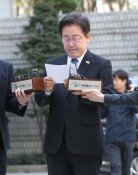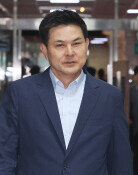President Yoon joins NATO summit
President Yoon joins NATO summit
Posted June. 27, 2022 07:59,
Updated June. 27, 2022 07:59
South Korean President Yoon Suk-yeol is scheduled to leave for Madrid in Spain on Monday to join the 2022 NATO Summit from Wednesday to Thursday. He will become the first South Korean president to attend a NATO summit as the organization has sent an invitation to four Asia-Pacific countries – South Korea, Japan, Australia and New Zealand. His itinerary includes a trilateral meeting with the United States and Japan and bilateral talks with many global leaders. President Yoon is unlikely to have a bilateral meeting with his Japanese counterpart and a multilateral talk with the leaders from the Asia-Pacific Region, according to South Korea’s presidential office.
President Yoon’s joining of the forthcoming NATO summit holds great significance in that it is his first presidential visit overseas to communicate and interact with multiple international leaders. The summit is line with the Yoon administration’s diplomatic basis of laying the foundation as a “global pivotal state” by expanding diplomatic power that is commensurate with its 10th largest economy in the world. Equally importantly, it also serves as an extended global platform of “value alliance” that has been strengthened since the KORUS summit right after President Yoon’s inauguration.
Nevertheless, opportunities come with risks. The summit of the military alliance among Western nations opens at a time when Russia’s invasion into Ukraine has lasted more than four months while the power struggle between the United States and China is escalating to have an all-encompassing impact across the globe. Added to this, the NATO leaders in Madrid plan to discuss a new version of the Strategic Concept that is updated for every 10 years, which is expected to include initiatives to respond to the challenges arising from Russia and China. Beijing already seems displeased with such a move, saying, “We firmly oppose any act that instigate division and confrontation.”
The South Korean government may automatically feel a diplomatic burden on its shoulders as it attends a meeting of the alliance among the Western countries in the new era of Cold War. However, the presidential office made it clear that President Yoon’s participation in the NATO summit is irrelevant to the nation’s likelihood of leaning toward policies against Russia and China. This may also explain why the administration focuses on a higher level of integrity based on values and liberal democracy while making a pragmatic effort to build a comprehensive security network for peace and denuclearization on the Korean Peninsula and enhance bilateral diplomatic relationships in semiconductors and nuclear technology.
In an era defined by a series of great shift where the international community is divided by values and ideologies while even the trends of an economic decoupling are taking place, it is not the right way to go to stay vague and indecisive diplomatically. The Yoon administration put its relationship with the West at the center of its diplomatic strategy. However, it cannot guarantee national interests merely by following the liberal international order. Each participating state in the upcoming summit will strive for their own national interests although they are part of the meeting based on common values shared across the alliance in the West. The NATO summit is hoped to give President Yoon, who is still new to the diplomatic arena, a great opportunity to build a hands-on experience with a lesson to be learned.







